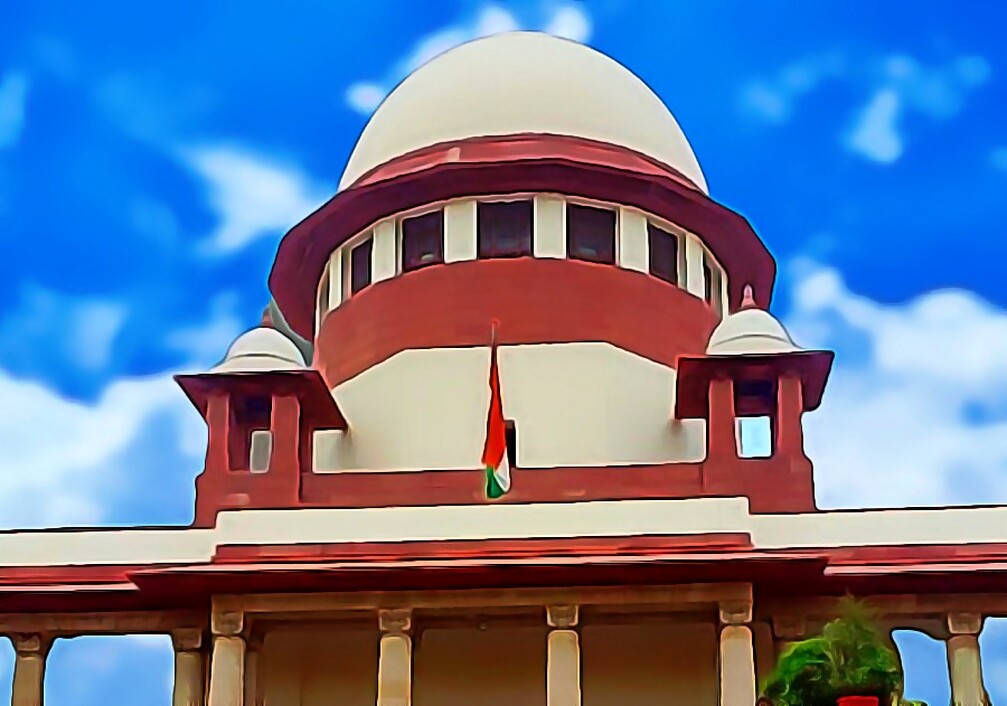It is open to CMM/DM to appoint advocate commissioner to assist him/her in execution of order passed u/s 14(1) of SARFAESI Act: SC

Read Judgment: Nkgsb Cooperative Bank Limited V. Subir Chakravarty & Ors.
Pankaj Bajpai
New Delhi, March 1, 2022: The Top Court has observed that being an officer of the court and appointed by the Chief Metropolitan Magistrate (CMM)/ District Magistrate (DM), the acts done by the Advocate Commissioner would receive immunity u/s 14(3) of the Securitization and Reconstruction of Financial Assets and Enforcement of Security Interest Act, 2002, as an officer authorized by the CMM/DM.
The Supreme Court said that apprehension of the borrowers about improper execution of orders of the CMM/DM passed u/s 14(1) of the 2002 Act by the Advocate Commissioner, is plainly misplaced and therefore, it would be open to the CMM/DM to appoint an advocate commissioner to assist him/her in execution of the order passed under Section 14(1) of the 2002 Act.
A Division Bench of Justice A.M Khanwilkar and Justice C.T Ravikumar observed that an advocate is and must be regarded as an officer of the court and subordinate to the CMM/DM for the purposes of Section 14(1A) of the SARFAESI, 2002.
Going by the background of the case, the Chief Metropolitan Magistrate (CMM)/ District Magistrate (DM) appointed an advocate purportedly in exercise of powers u/s 14(1A) of the 2002 Act. In the cases arising from the judgment of the Bombay High Court, the borrowers had urged before the High Court that the Additional Chief Metropolitan Magistrate (ACMM), 3rd Court, Esplanade, Mumbai on application filed by the secured creditor (Bank) u/s 14 of the 2002 Act passed an order appointing an advocate to take possession of the secured assets and documents relating thereto and to forward the same to the secured creditor.
The order passed by the ACMM records that the Bank had advanced a loan in the sum of Rs.4.44 crore to the borrowers, who had mortgaged a flat with two basement car spaces in a building known as ‘Kalpataru Pinnacle’ in Goregaon (West), Mumbai. Since, the borrowers had defaulted, their account was declared as Non-Performing Asset (NPA). As a sequel, a notice u/s 13(2) of the 2002 Act was issued to them. However, the docket was returned with ‘intimation posted’. Since the loan amount remained unpaid, the secured creditor approached the ACMM who passed an order appointing an advocate. The same was communicated to the borrowers, who approached the Bombay High Court which held that Section 14(1A) of the 2002 Act does not permit the CMM/DM to authorize an advocate. On the other hand, the Madras High Court accepted the argument of the secured creditor (Bank) that it was open to the CMM/DM to appoint an Advocate Commissioner for taking possession of the secured assets and documents relating thereto for being forwarded to the secured creditor in terms of Section 14(1A) of the 2002 Act. This decision has been challenged by the borrowers by way of a special leave petition. Hence, present appeals.
After considering the submissions, the Apex Court found that there is conflict of opinion between the three High Courts (High Courts of Kerala, Madras and Delhi) on the one side and the Bombay High Court on the other.
“In absence of express provision, such as sub-Section (1A) under the unamended Act, the CMM/DM could take possession of secured assets on a written application made by the secured creditor under Section 14(1); and while doing so in terms of Section 14(2) of the 2002 Act, it was open to the CMM/DM to take or cause to be taken such steps and use, or cause to be used, such force, as may, in his opinion be necessary. This would include taking assistance of the local Police to obviate any untoward situation or law and order problem at the site while taking over possession”, noted the Court.
Speaking for the Bench, Justice Khanwilkar Khanwilkar found that the underlying purpose of the 2002 Act is to empower the financial institutions in India to have similar powers as enjoyed by their counterparts, namely, international banks in other countries, and one such feature is to empower the financial institutions to take possession of securities and sell them.
Section 14 of the 2002 Act predicates that if the secured creditor intends to take possession of the secured assets, must approach the CMM/DM by way of an application, in writing, and on receipt of such request, the CMM/DM must move into action in right earnest, added the Bench.
Justice Khanwilkar added that after passing an order thereon, he/she (CMM/DM) must proceed to take possession of the secured assets and documents relating thereto for being forwarded to the secured creditor in terms of Section 14(1) read with Section 14(2) of the 2002 Act.
Considering the scheme of the 2002 Act, it is explicit and crystal clear that possession of the secured assets can be taken by the secured creditor before confirmation of sale of the secured assets as well as post confirmation of sale, added the Bench.
Hence, the Apex Court set aside the order passed by the Bombay High Court and delinked the SLP filed by the borrowers against the order of Madras High Court for being heard for admission on March 4, 2022, on the limited issue regarding compliance or non-compliance of clauses (i) to (ix) of Section 14 of the 2002 Act.
Sign up for our weekly newsletter to stay up to date on our product, events featured blog, special offer and all of the exciting things that take place here at Legitquest.




Add a Comment